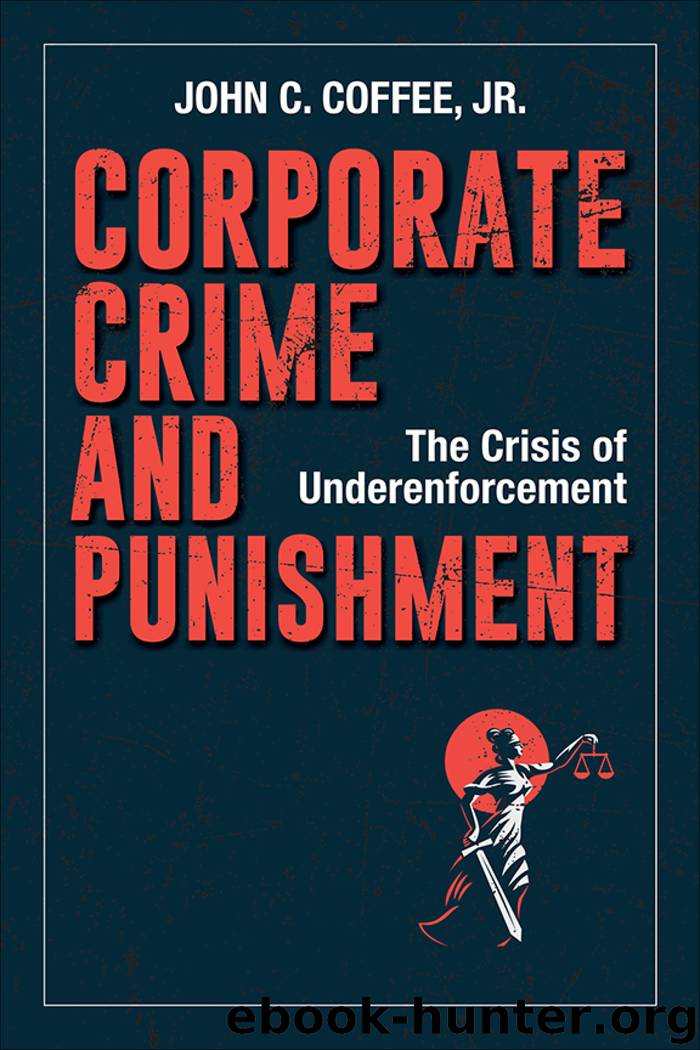Corporate Crime and Punishment by John C. Coffee

Author:John C. Coffee [John C. Coffee]
Language: eng
Format: epub
Publisher: Berrett-Koehler Publishers
Published: 2020-08-03T16:00:00+00:00
Putting the Bounty Hunter to Work
Private litigation in the United States typically compensates the plaintiff’s attorney in a personal injury case through a contingent fee. Such an attorney in effect “eats what he or she kills” and gets nothing if he or she loses. Generally, this compensation is paid based on a percentage of the recovery. Thus, if you trip on an icy sidewalk and break your leg, you may wish to sue the shopkeeper who did not shovel the snow and ice off that sidewalk, and you would probably hire a plaintiff’s attorney under a standard fee agreement that paid him one-third of your recovery.
That’s a simple example, but the same rules apply in the more complicated work of class actions. Financial institutions are regularly sued by disappointed investors in securities class actions, and the fee awards in these cases are typically computed on a percentage of the recovery basis. The court (which must approve the fee request in a class action) generally uses a “declining percentage of the recovery” formula.31 Thus, the plaintiff’s attorney may get 25 percent of the first $100 million recovery but only a much lesser percentage (say, 2–5 percent) of the recovery over $1 billion. Recoveries are almost always by way of settlement (as both sides prefer to avoid trial), and a number of these settlements in securities class actions have exceeded the $1 billion level. Of course, to obtain such a recovery, the plaintiff’s attorney must pay out of the attorney’s own pocket millions of dollars in costs (including the salaries of the attorney’s own legal staff). This is risky, and many have failed. But there is a well-organized plaintiff’s bar bringing securities class actions on a steadily increasing basis, and the leading practitioners on the plaintiff side in this field probably make annual incomes at least as high as those of the leading defense practitioners.32
Would plaintiff’s attorneys be interested in representing an administration agency in enforcement litigation against large financial institutions? The answer is of course! But their use would only be feasible in cases in which the expected recovery (i.e., the likely fine or penalty) would exceed some minimal level (say, $15 million). Anything below that level represents too cheap a payoff to attract the risk-taking legal entrepreneur who specializes in securities class actions. Such cases may be plentiful, however, because the SEC can seek disgorgement of ill-gotten gains and restitution,33 which in many cases would typically fund a more than adequate recovery for the plaintiff’s attorney. The plaintiff’s attorney would also gain prestige and the reputational advantage of having represented the United States, which would carry over to other cases. Finally, such a plaintiff’s attorney would face much better litigation odds than in the standard private case. Juries are more likely to trust counsel for the United States (or the SEC) in comparison to counsel for an unknown individual plaintiff (whose client often has credibility or other problems associated with the individual case).
What would the administrative agency gain from using
Download
This site does not store any files on its server. We only index and link to content provided by other sites. Please contact the content providers to delete copyright contents if any and email us, we'll remove relevant links or contents immediately.
The Social Psychology of Inequality by Unknown(3031)
The Plant Paradox by Dr. Steven R. Gundry M.D(2620)
The Writing on the Wall by Anselm Jappe(2046)
Working for Yourself by J.D. (Nolo) Stephen Fishman(1873)
Get What's Yours for Medicare by Philip Moeller(1740)
Every Landlord's Legal Guide by Janet Portman & Stewart Marcia & Ralph Warner(1675)
The First 20 Hours: How to Learn Anything ... Fast by Kaufman Josh(1667)
ADHD on Trial by Michael Gordon(1578)
Decisive by Chip Heath(1568)
Working for Yourself by Stephen Fishman J.D. (Nolo)(1530)
Drafting Contracts: How and Why Lawyers Do What They Do, Second Edition by Stark Tina L(1499)
A Practical Guide to International Arbitration in London by Hilary Heilbron(1441)
The Lord of the Rings: The Fellowship of the Ring, the Two Towers, the Return of the King by J. R. R. Tolkien(1439)
The Economist Aug 8th 2015 by The Economist(1428)
Restitution by Restitution(1428)
Intellectual Property Strategy by John Palfrey(1425)
The Economist Aug 29th 2015 by The Economist(1391)
Collusion by Luke Harding(1323)
Persuasion by Owner(1297)
